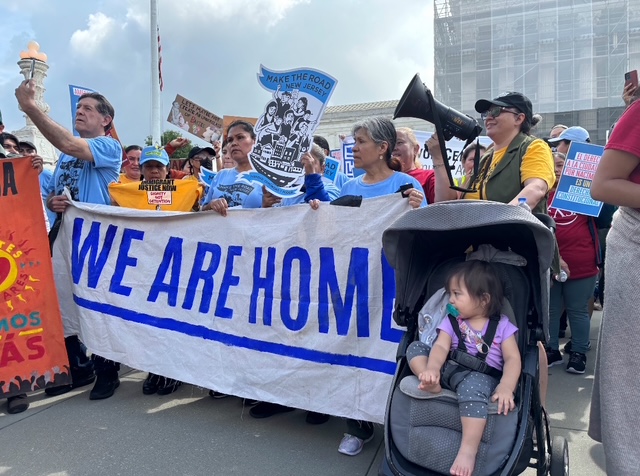Representative Adriano Espaillat (D-NY) paid tribute to the American rock n’ roll singer Bruce Springsteen by inciting a collective rendition of “Born in the U.S.A” on May 15 outside the Supreme Court with several immigrant advocates.
“Born in the U.S.A.” is a song about a Vietnam War vet returning home to a country that has forgotten him. For a song critical of a period of American political history, it was used by several politicians as a patriotic symbol, including Ronald Reagan in a 1984 campaign speech.
In truth, Springsteen called it “a protest song” in his 2016 memoir, a song not meant to decry patriotism but instead demand better as an American. As the 14th Amendment risks reinterpretation if President Donald Trump’s Jan. 20 executive order attempting to selectively deny birthright citizenship is successful, this sentiment was brought back before the highest court.
“When everything else fails, we come to the steps of the U.S. Supreme Court and ask for fairness, we come and ask for justice, and we come and we ask for a shot for all kids to be equal under the law,” said Espaillat during his speech. Espaillat is the first immigrant who was formerly undocumented to serve in Congress.
CASA, an organization aiming to improve the lives of immigrants and working-class families, led the protest as oral arguments began for the birthright citizenship case. Acting as plaintiffs in the case, they advocated for Justices to uphold the historic interpretation of the 14th Amendment by maintaining lower court judges’ ability to issue nationwide injunctions.
CASA sued the Trump administration for an executive order in January that attempted to deny birthright citizenship to children born in the U.S. to undocumented and visa-holding immigrants. Three groups’ litigations against the Trump administration were consolidated into one.
Of the 11 million undocumented immigrants in the U.S., approximately 6.9 million are Latin American, according to Pew Research. There are no publicly available numbers on how many Latinos hold visas, though 30% of Hispanic immigrants hold a visa or green card in the U.S.
Birthright citizenship refers to a right enshrined in the 14th Amendment, which says: “All persons born or naturalized in the United States, and subject to the jurisdiction thereof, are citizens of the United States and of the State wherein they reside.”
Trump’s justification for this interpretation of the 14th Amendment stems from the belief that the Constitution is not fully applicable to immigrants who are not permanent residents. The executive order altering birthright citizenship faced several nationwide injunctions.
The protest began at 9 a.m. as people showed up in red shirts with CASA in white lettering, some with bullhorns or signs in hand. Though the protest began under cloudy conditions, the sun came out around 10:40 a.m. just as a slew of speakers took the stage, including Representative Delia Ramirez (D-IL), Representative Pramila Jayapal (D-Wash.), Speaker Emeritus Nancy Pelosi (D-MD), and CASA’s legal director, Ama Frimpong.
Speaker Emeritus Nancy Pelosi quoted Thomas Paine, the founding father of the U.S. and author of the American Revolution pamphlet Common Sense, when delivering her speech.
“Thomas Paine said, ‘The Times have found us.’ They found the revolutionaries to establish our country. Well, the Times have found us to protect our Constitution,” she said.
Representative Ramirez, the daughter of Guatemalan immigrants, said she stood in front of the Supreme Court as both a Guatemalan and an American.
“As the first Latina in Congress from the Midwest, I also proudly tell you that I am a birthright citizen,” Ramirez said.
While the arguments on May 15 were specifically about whether lower courts had the power to issue injunctions that block federal laws or policies, some of the Justices seemed eager to issue a separate ruling about birthright citizenship itself. The Supreme Court will likely deliver its ruling in Trump v. CASA in late June or early July.
“It’s really important because this is the way they are trying to get around all of their illegal actions is to say that federal judges don’t have the ability to stop these things if they issue an executive order,” Representative Pramila Jayapal said. “Just imagine what that means in the case of birthright citizenship.”
